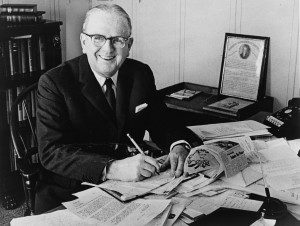
Norman Vincent Peale may be best known as the author of The Power of Positive Thinking. First published in 1952, the book went on to sell 5 million copies and is still a Top-10 “religion & spirituality” book at Amazon today. It was one of 41 books Peale wrote during a distinguished life that included receiving the Presidential Medal of Freedom, the highest civilian award of the US, in 1984.
More than a writer, Peale was also an ordained minister. He served as head of the Marble Collegiate Church on Fifth Avenue in Manhattan for over 50 years and preached there well into his 80s. During his tenure, the church grew from a few hundred to over 5,000 congregants and is still active today.
Now if you have ever read the work of Norman Vincent Peale, his positive aphorisms seem innocent enough. After all, who can disagree with sayings like this:
Believe in yourself! Have faith in your abilities! Without a humble but reasonable confidence in your own powers you cannot be successful or happy.
Empty pockets never held anyone back. Only empty heads and empty hearts can do that.
If you have zest and enthusiasm you attract zest and enthusiasm. Life does give back in kind.
Yet, despite his success as both an author and preacher, there were many in the Christian community who saw his “power of positive thinking” as downright dangerous, even cultish. For instance, consider these harsh opinions of Peale that came from three fellow religious leaders in the 1950s.
“This new cult is dangerous. Anything which corrupts the gospel hurts Christianity. And it hurts people too. It helps them to feel good while they are evading the real issues of life.” ~ Reinhold Neibuhr, Professor of Applied Christianity, Union Theological Seminary
“It has sort of a drug effect on people to be told they need not worry. They keep coming back for more. It is an escape from reality.” A. Powell Davies, pastor of All Souls’ Unitarian Church, Washington D.C.
“There is nothing humble or pious in the view this cult takes of God. God becomes sort of a master psychiatrist who will help you get out of your difficulties. The formulas and the constant reiteration of such themes as “You and God can do anything” are very nearly blasphemous.” ~Liston Pope, Dean of Yale Divinity School
To Pope’s point, Peale believed there was a simple 7-word combination that had the power to cause a dramatic and positive impact on your life. He claimed that it helped many people he knew and all you had to do was silently repeat these words throughout the day. As retold by John Templeton, this “formula for success” had the power to “erase failure, increase strength, eliminate fear and overcome self-doubt.” The words are:
I can do all things through God.
These seven words sum up Peale’s belief that all things were possible if we went about out lives with a positive attitude and recognized there was a higher power that could help us along the way. Yet, it was statements like this that ran (and still run) contrary to the beliefs of many in the religious community.
While Peale was a Christian, he believed that Jesus Christ wasn’t the only pathway to God and that no religion had a monopoly on our ability to connect with God. Take this statement from Peale that was first published in his Plus: The Magazine of Positive Thinking:
Who is God? Some theological being? He is so much greater than theology. God is vitality. God is life. God is energy. As you breathe God in, as you visualize His energy, you will be reenergized!
Or this thought he shared with the talk show host Phil Donahue:
It’s not necessary to be born again. You have your way to God. I have mine. I found eternal peace in a Shinto shrine…I’ve been to Shinto shrines and God is everywhere…Christ is one of the ways! God is everywhere.
God is a source of energy! God can be found in a non-Christian religion! God is everywhere! Blasphemy say the critics! Yet, I find it all very refreshing. It takes the concept of God beyond the rigid dogma of religion and positions this higher power as a powerful force in our everyday lives–one that’s available not to a select few, but to everyone. And what’s wrong with that?












